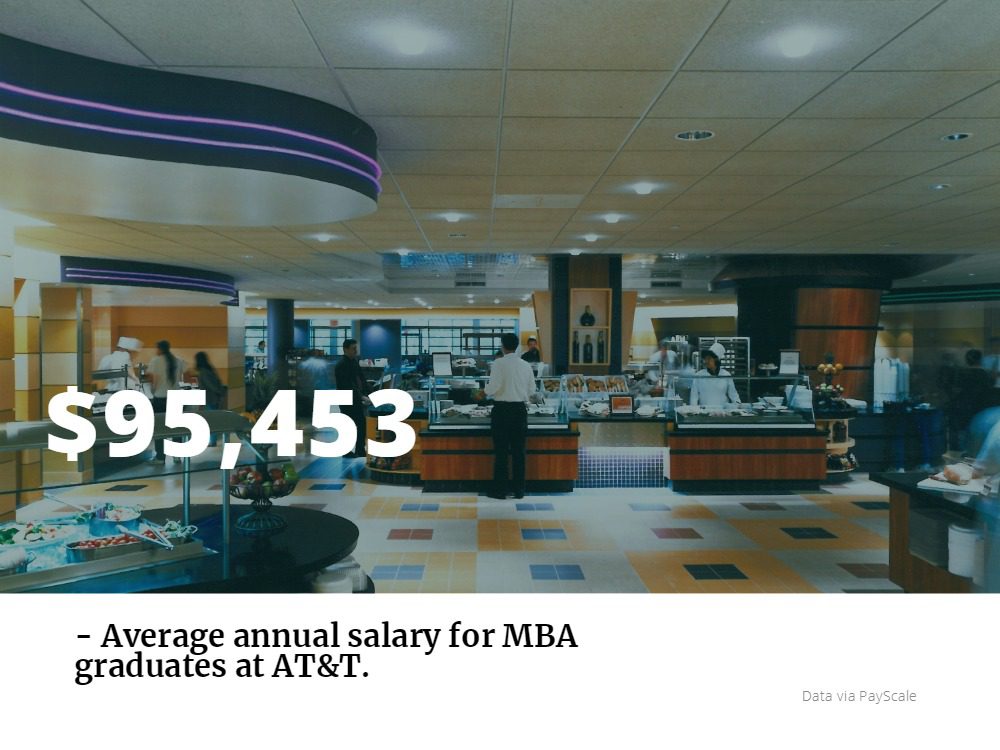Top MBA Recruiters: AT&T

Finding employment after graduating from an MBA program can be a challenge for some. Thankfully, new MBAs are never alone in the process. From companies that actively recruit talent from business schools throughout the country, to MBA programs themselves helping to facilitate interviews and job referrals for their students, students should be sure to take advantage of resources available to them.
A look at 2017 employment data from a top MBA program like the University of Chicago’s Booth School of Business reveals the overwhelming trend: a whopping 89.2 percent of students found employment through university-facilitated avenues, be it on-campus recruitment and interviews, networking events, or through a Booth-facilitated summer employer. The success of campus recruitment benefits everyone, not only because universities are willing to open their doors and advocate for their students, but because top companies go out of their way to recruit young talent and create opportunities for them.
One such company is American multinational telecommunications holding company, AT&T. Founded in 1983 as the Southwestern Bell Telephone Company—part of the Bell Telephone Company with roots in the late 19th century—today AT&T has more than 254,000 employees worldwide and $190 billion in revenue. With a commitment to MBA graduates through internships and early career development programs, AT&T makes the grade as a top recruiter and employment destination for MBAs.
What Is An AT&T Career Like for MBAs?
It should be no surprise that MBAs love working at AT&T when you know the kind of investment this company makes in the educational development of its employees. In 2016, AT&T spent $250 million on employee training and invested roughly 20 million hours into the process. With so many opportunities for ambitious team members to accelerate their careers through leadership and development programs, this is the perfect company for those looking to quickly rise into leadership roles.
AT&T has been awarded many times for its workplace culture, including being named on Fortune‘s ‘100 Best Companies to Work for in 2018‘ and 3rd overall on the Diversity Inc. list of the ‘Top 50 Companies for Diversity‘ in 2018.
Of course, it pays to have an AT&T career, even beyond a positive workplace culture. According to PayScale data, MBA graduates at AT&T earn an average annual salary over $95,000. This can range as high as $142,000 for those in operations management. Employees, including interns, are rewarded with competitive compensation and benefits, including paid holidays, time off, and discounts for AT&T products.

Getting Started
MBA students interested in starting an AT&T career should keep an eye out for the various recruitment events set up through their university, where they can apply on campus and may be selected to interview with college recruiting managers. Because of the company’s heavy investment in a diverse workforce, AT&T also has a strong presence at recruitment conferences like the Forté Foundation for female business leaders, Reaching Out MBA for LGBT candidates, and the National Black MBA Association (NBMBAA).
Many MBAs start their AT&T career through its many internship opportunities, which are found at locations throughout the country and typically last 10-12 weeks. AT&T offers these paid internships a huge variety of fields, such as data analytics, cybersecurity, entertainment group technology, software development, and leadership, among others.
In addition to internships, MBA graduates may apply for one of the many AT&T career development programs. These are full-time, paid rotational programs that may last anywhere from two to three years, providing hands-on experience, exposure and opportunity. Development programs at AT&T include:
- B2B Sales
- Cybersecurity Development
- Engineering and Operations Development
- Finance Leadership Development
- Leadership Development
- Software Development
What Does AT&T Look for in MBA Candidates?
When hiring for its MBA internships and development programs, AT&T looks for students with at least three years of professional experience with the ability to collaborate on complex issues and thrive in a leadership role. The company seeks candidates who are passionate about the role technology can play in people’s lives and its capacity to transform.
In addition to the internships and early career programs, AT&T also looks for more experienced MBA holders for higher-level executive and management positions. For these roles, the company seeks candidates with at least five to eight years in experience related to the role with the ability to work in a team, be a self-starter, and think critically.
New MBA Jobs: IBM, BB&T, Comcast, Deloitte, and Chevron

Want to know the best new MBA jobs out there? This guide is where you want to be. Browse some of the top job openings at the following top MBA employers below, and apply today! Continue reading…
Where Can I Get My Summer Internship?

In part one of our primer on MBA internships—”What is a Summer Internship and Why Should I be Interested?“—we took a closer look into the benefits of having a summer internship and where to start to look for one. Today, we’ll start to dive deeper into what types of opportunities are available, which companies offer them, and the potential salaries interns can make.
Where Can I Find a summer Internship?
You might already be sold on the idea of getting a summer internship, but if you’re going to reap the benefits of an internship, you’ll have to find one first.
A look at summer interns at business schools throughout the country reveals some common trends. While students find and get internships in a variety of ways, the most common method by far as through university resources. At the Booth School of Business at the University of Chicago, for example, 86.7 percent of students had their internships facilitated by the school, whether through campus interviews, connections made through networking, or other sources like faculty and student groups. For the much smaller percentage who found summer internships on their own, it was a fairly even split between students with personal connections and those who applied directly through a company’s website or job board.
If you’re looking for the perfect summer internship, making use of your school’s Career Services department can be crucial part. A quick look at the Booth School’s Career Services can help make sense of that 86.7 percent number: the office provides students with help in networking, interviewing, negotiating and more. These skills might be gained through workshops, one-on-one coaching, and other techniques to help steer students through their internship experiences and onto careers.
What Will I Be Doing?
The types of opportunities available for MBA summer internships are just as varied as the students themselves. At the University of Pennsylvania’s Wharton School, two functions emerged as the most popular (marketing and education, with 17.2 percent of Wharton interns and 15.4 percent, respectively), but overall revealed a huge variety of industry and fields. From hospitality to insurance to real estate, Wharton student interns spent their summers doing a little bit of everything. Students also did not seem to be restricted in their internship by location. While 28 students did stay in the state of Pennsylvania to complete their internship, a nearly even number took on internships in New York City, and many more spread throughout the country in states like California, Massachusetts, and the District of Columbia. Over 22.5 percent of students even completed internships outside of the United States.

Nearly a quarter of Wharton MBAs complete their summer internships outside of the United States.
The type of work performed by interns each summer can also vary heavily, depending on the company, the position, and even a students own career goals and abilities. There is also a lot of variety as far as the scope of each internship: while some interns work full-time hours over the course of a summer, other roles may require less of an extended time commitment. For Wharton interns working full-time over the summer, internship length had a huge range and might run anywhere from three to seventeen weeks.
Most major companies that hire and recruit MBAs will have some type of internship program already in place, but looking at past internship and employment reports at your university can provide a good snapshot of what types of companies students typically intern with. At Northwestern University’s Kellogg School of Management, there were a number of companies hiring more than three students, while some hired more than 25 Kellogg students. Companies like Amazon, McKinsey & Company, and the Boston Consulting Group emerged among the top hiring companies of MBA interns from Kellogg.
In a tech company like Amazon, the type of internships offered to students can also vary widely. Students interested in working for the company might find internships available in the Finance Leadership Development Program, the Retail Leadership Development Program, the AWS CloudPath Program manager and more.
How Much Will I Make?
With the length of every internship and the hours required varying so significantly, how can students be sure their internship can support them through the summer?
A look at MBA internships and the salaries they offer from month to month reveal a general trend of well-paid internships even in industries on the lower end of the payment range. Far from the typical unpaid internship that so often springs to mind when students search for summer gigs, payment for these MBA internships can range from $1,000 per month to more than $14,000. The tremendous range in these numbers is mostly the result of differences in industry and function for each internship. At the Anderson School of Management at UCLA, for instance, student interns in consulting reported salaries ranging from $4,333 to $14,083 per month. Even the industries with the lowest salaries overall still boast pay that can generally support a student’s cost of living for the summer. For job function, the highest paid internships were in management/strategy ($500-$14,083), while the lowest were in human resources ($520-5,600).
With the possibility of high salaries, networking opportunities, and even the chance to turn an internship into a full-time career, it’s no surprise that so many MBAs participate in summer internship programs. At UCLA Anderson, 227 students of 238 sought internships for the summer—and 227 found them.
Your internship goals also might help you pick the right MBA program if you are still undecided. Looking into the success rate of internship placements at each school, as well as where students typically intern and the range of salaries they earn, might make the difference between two otherwise equal programs.
The Future of Employment at Philly Business Schools

When considering where to get your MBA, one of the first questions you should ask is, “What will my employment outlook be?” After all, the reason you get an MBA is to improve your career. But what is important when it comes to employment trends at the leading business schools in Philadelphia? There are quite a few different statistics you should look at.
Important MBA Employment Statistics
To choose an MBA program based on your future career success, there are a few questions you need to answer.
- What industry do I want to work in and does the school place a majority of their students in that industry?
- What percentage of students receive and accept job offers? The same for internships?
- Self-employed or entrepreneurship data?
- What salary can I expect?
- Where do most students end up living and work?
- Who are the top employers?
You also want to look at any trends between years. For example, the percentage of students receiving job offers should increase year-over-year. And if you see a shift from the consulting industry to financial services, you want to be aware that the school could be changing its direction.
So, what does employment look like for three of the top Philly business schools?
The Wharton School
At the Wharton School at the University of Pennsylvania, the employment trends year-over-year are fairly consistent. While the percentage of students reporting job offers dropped from 2016 to 2017, part of that reason may be the increased number of students seeking employment (75.2 percent vs. 79.1 percent).
As for the increase in median salary, that can be attributed to inflation as well as an increase in job salary for each industry including professional services rising from $160,000 in 2016 to $180,000 in 2017. The location of jobs also changed slightly between 2016 and 2017, but that could be due to various reasons including the current state of international affairs for the U.S.
| The Wharton School | 2017 | 2016 |
|---|---|---|
| Percentage of students reporting job offers | 97.1 percent | 98.3 percent |
| Percentage of self-employed students or those starting their own business | 4.8 percent | 5.8 percent |
| Median Salary | $130,000 | $125,000 |
| Location Choices | 88.7 percent U.S. 11.3 percent International | 86.9 percent U.S. 13.1 percent International |
As for where MBA students at the Wharton School gain employment, there are a few important notes. The same top three industries—financial services, consulting, and technology—attracted students in both 2016 and 2017. However, the percentages were a little more evenly distributed in 2017. As for the companies hiring students, most of the same companies showed up each year.
| Top Three Industries | Percentage of Students (2017) | Percentage of Students (2016) | Companies Employing Two or More Students (2017) |
|---|---|---|---|
| Financial Services | 32.7 percent | 35.1 percent | Barclays, CITI, and HSBC |
| Consulting | 28.3 percent | 26.6 percent | A.T. Kearney, McKinsey & Company, and Boston Consulting Group |
| Technology | 16 percent | 12.6 percent | Adobe Systems, Amazon, and IBM |
Penn State Smeal College of Business
Pen State’s Smeal College of Business is consistent year-over-year in regards to its MBA employment trends. The percentage of student reporting and accepting job offers increased between 2016 and 2017 from 88.9 percent to 91.5 percent. However, the median salary stayed consistent at $105,000, and the hiring trend of most MBA students staying in the U.S. also remained the same.
| Penn State Smeal College of Business | 2017 | 2016 |
|---|---|---|
| Percentage of Students Reporting Job Offers | 91.5 percent | 88.9 percent |
| Median Salary | $105,000 | $105,000 |
| Location(s) | 98 percent U.S. 2 percent International | 96.5 percent U.S. 3.5 percent International |
As for where MBA students at Smeal College gain employment, there are a few important notes. While the same industries made the top four each year, where they placed changed. In 2016, the top industry was consulting (25 percent) while that changed to manufacturing in 2017 (20 percent). In 2017, retail also moved into tie consulting for the second most sought-after industry, while technology actually decreased year-over-year (23 percent vs. 15 percent).
| Top Four Industries | Percentage of Students (2017) | Percentage of Students (2016) | Companies Hiring |
|---|---|---|---|
| Consutling | 18.5 percent | 25 percent | Deloitte, EY, and PricewaterhouseCoopers |
| Technology | 15 percent | 23 percent | Amazon, Apple, and Dell |
| Manufacturing | 20 percent | 14 percent | Amphenol Corp, CHEP, International Inc. |
| Retail | 18.5 percent | 14 percent | Anheuser-Busch, Proctor & Gamble, and Johnson & Johnson |
Rutgers Business School, Camden
In 2017, the Financial Times ranked the Rutgers MBA as the best program for MBA employment across Big 10 schools. In 2016, Bloomberg Businessweek also ranked Rutgers as the best MBA program for job placement in the U.S. This indicates a relatively steady year-over-year employment trend for MBA students.
As for the median salary of a Rutgers MBA, students in 2017 could expect to earn $95,680. As for the most popular industries, they were:
- Pharmaceutical/Biotech/Healthcare: 46 percent
- Consulting: 13 percent
- Consumer Products: 13 percent
- Other: 14 percent
Making Your Post-MBA Career with Visa Inc.

The race for superiority in the global electronic payments market is a heated one. Every major credit card company has pulled out all the stops to persuade consumers to embrace digital transactions as their primary payment method—and they are going to need all the help they can get. It’s one of many reasons why major companies like Visa are always recruiting MBAs.
The Secret to Writing a Successful MBA Career Goals Essay in 2018

The MBA application essay is still the most feared part of most applications. Whether you have to write 1,000 words or just 500, saying everything you need to say in a concise, intelligent, and appropriate manner isn’t easy for everyone. In fact, it can be incredibly frustrating. And while every school asks different essay questions, there’s one question you’re almost guaranteed to see, “What are your short-term and long-term post-MBA career coals and how will School X help you achieve these goals?”
The career goals essay is one of the most common and also most difficult essay questions. On the surface, it seems simple, but there’s a lot of work required if you want to wow the admissions committee (adcom). It all starts with the question.
Breaking Down the MBA Career Goals Essay
Before you can write your career goals essay, you have to break it down into digestible and answerable pieces. There are six pieces to the career goals essay that you’ll need to consider before you begin writing.
1. Where are you now?
Before you can talk about your goals, you have to know where you are now and so does the adcom. This means that your essay will need to concisely describe your current position so that you can better explain your goals.
2. What are you short-term goals?
Short-term and long-term goals are not the same. Short-term goals refer to your immediate plans after graduation. Is there a particular industry where you want to work? Do you have a job or promotion in mind? Where do you see yourself in the immediate months post-MBA?
3. What are your long-term goals?
Long-term goals take a little more thought. You might not be as specific about companies or job titles when talking about your long-term goals, but that doesn’t mean you shouldn’t have a plan. Think about where you want the MBA to take you in ten or twenty years.
4. Why will an MBA help?
Next, you need to discuss how an MBA will help you achieve both your short-term and long-term goals. You’ll need to discuss technical skills, analytical skills, focus areas, and more.
5. Why is the School vital?
You need to make your essay personal. Not just any MBA should work for your goals. You need to explain specifically why School X is vital to your success. Get as specific as possible.
6. Why now?
Finally, you need to discuss why NOW is the best time to get your MBA and pursue your goals. Make a case for why this year, this class, and this moment are vital to your life.
Writing the MBA Career Goals Essay
Now that you know all the components of the essay, it’s time to start writing. To successfully answer the question, there are a few things that you need to keep in mind.
Be Specific
You need to be as specific as possible when answering each of the six parts of the question. MBA adcoms want to see that you have a specific direction in mind and that you have valid reasons for your choices. If possible, you should be able to specify your preferred industry, job function, skills, ideal company, and more.
For example: Talk about how you want to move into a career in Finance and gain a job at Goldman Sachs. Then, talk about how the MBA will help you gain technical skills in Finance and Accounting as well as analytical skills in Corporate Strategy and Strategic Planning. Finally, discuss how the case competitions at School X, as well as the MBA Finance Club, will prepare you for this career field.
Be Realistic
Adcoms want you to dream big, but they also want you to be realistic. There’s nothing impressive about an MBA career goals essay that describes a future path that is unreachable or illogical. Unrealistic goals will not serve to demonstrate that you’re ready for an MBA. Instead, you need to walk the fine line between thinking big and demonstrating that your career path has been well thought out and planned. Look up hiring trends, services, organizations, market status, and competitive concerns within your desired industry and companies.
For example: It’s okay to talk about your goals of managing a billion dollars, but you should indicate that this is a long-term goal, and you have a plan to reach it. Go step-by-step to illustrate that you know what it takes to reach your high aspirations by first talking about starting as a Finance Manager and slowly working your way up over twenty years.
Be Genuine
Adcoms can smell BS. You have to convince them that you are genuine in your interest of not just the MBA but of earning an MBA from School X. Take time to do your research and dig deep for those specific offerings from the program that will best serve you and your goals. If you can name specific classes, on-campus impressions, or information you’ve learned from alumni to demonstrate your genuine desire for an MBA, you’ll be in a much better place.
For example: Set up an interview to talk with an adcom or alumni before you write your essay. Then, during that interview, ask questions that will give you the information you need to beef up your essay. If you can talk about how an alum took the same career path and succeeded, you not only demonstrate your interest but your keen intellect.
Be Clear
Finally, make sure you write an essay that is clear and easy to read. Don’t worry about crafting the next great American novel. Instead, focus on answering the question as simply as possible and including all the necessary pieces. This is not a creativity contest. Instead, create a simple outline that you can fill out to answer the six components of the essay.
For example: You should write out the six questions (career analysis, short-term goals, long-term goals, why MBA, why School, why now) and come up with your answers separately. Then, once you have the outline and all the pieces, compile them together into a cohesive story. Don’t try anything fancy.
